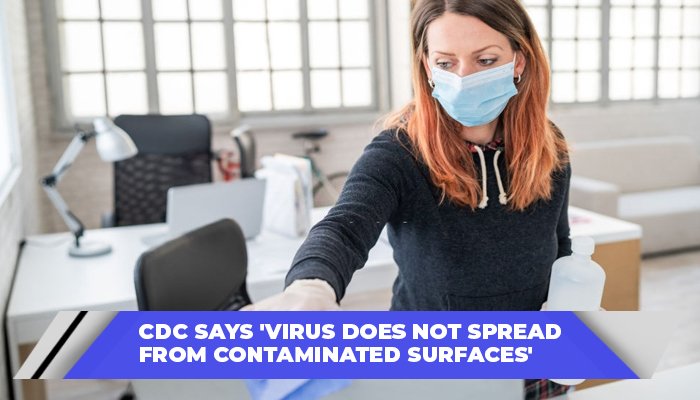Health News
CDC Now Says ‘Coronavirus Does Not Spread Easily From Touching Surfaces Or Objects

The center for disease control and prevention(CDC) is the leading, national public health institute of the United States. It is a United States federal agency, under the Department of Health and Human Services, headquartered in Atlanta, Georgia. CDC works 24 hours to protect America from health, safety, and security threats. Whether diseases start at home or abroad, are chronic or acute, curable or preventable, human error or deliberate attack, CDC fights disease and supports communities and citizens to do the same.
Contents
CDC Says ‘Virus Does Not Spread From Contaminated Surfaces’
CDC also conducts critical science and provides health information that protects the USA. Now, the website of the CDC says that the coronavirus does not spread easily through touching surfaces or objects. Though it’s not exactly clear when the federal health agency appears to have recently changed its guidelines from early March that simply said it “may be possible” to spread the virus from contaminated surfaces. The federal agency also updated that the other ways in which the virus does not spread are from animals to people or from people to animals.
CDC Updated Their Guidelines
CDC website updated that “COVID-19 is a new disease, and we are still learning about how it spreads. It may be possible for COVID-19 to spread in other ways, but these are not thought to be the main ways the virus spreads”
The virus mainly spread from person to person very easily and causes COVID-19 infection. After a detailed preliminary study, CDC updated the following ways regarding virus spread.
- There is a great chance to spread the virus between people who are in close contact, which is less than 6 feet.
- The droplets of infected persons contain viruses and the person in contact with these droplets will be infected.
- Novel Coronavirus can be spread from people who don’t show any symptoms, maybe they were carriers of the virus.
“Many people were concerned that by simply touching an object they may get coronavirus and that’s simply not the case. Even when a virus may stay on a surface, it doesn’t mean that it’s actually infectious. I think this new guideline helps people understand more about what does and doesn’t increase risk. It doesn’t mean we stop washing hands and disinfecting surfaces. But it does allow us to be practical and realistic as we try to return to a sense of normalcy” Dr. John Whyte, chief medical officer quoted. Certainly, it is not a license to go out and touch every new surface you can find before contacting your ears, eyes, or face in general. It might be a relief to those who picked up a bag of chips at the grocery store and then instinctively scratched their head. The CDC also suggested ways to prevent infection.
Among that, the most important is practicing social distancing and staying at least 6 feet away from others, washing your hands using soap and water, disinfecting your hands, and other frequently touched areas using hand sanitizers.
“It also may help reduce anxiety and stress. Many people were concerned that by simply touching an object, they may get coronavirus, and that’s simply not the case. Even when a virus may stay on a surface, it doesn’t mean that it’s actually infectious,” Whyte told.
But a recent study in the New England Journal of Medicine found that coronavirus can survive on surfaces for up to three days and in the air for three hours. According to the study, the virus can live up to four hours on copper, up to 24 hours on cardboard, and up to 2-3 days on plastic and stainless steel. This contradicts the claim of the CDC.
























Michael Dorsa
May 28, 2020 at 8:29 am
Make up your mind if it can or cannot transmit easily